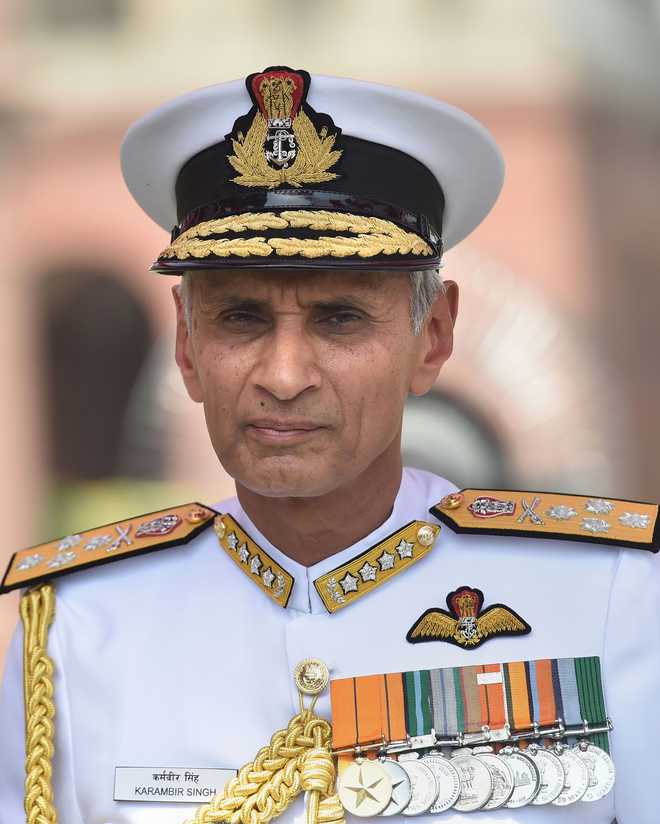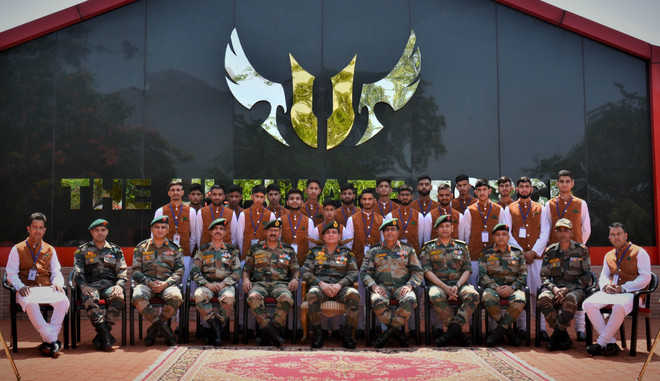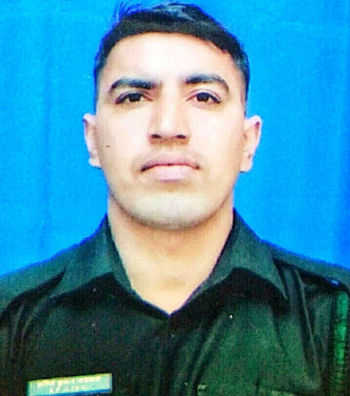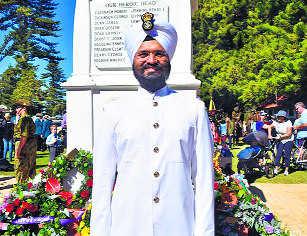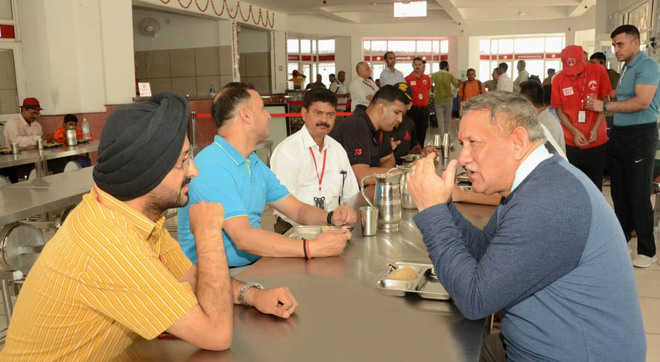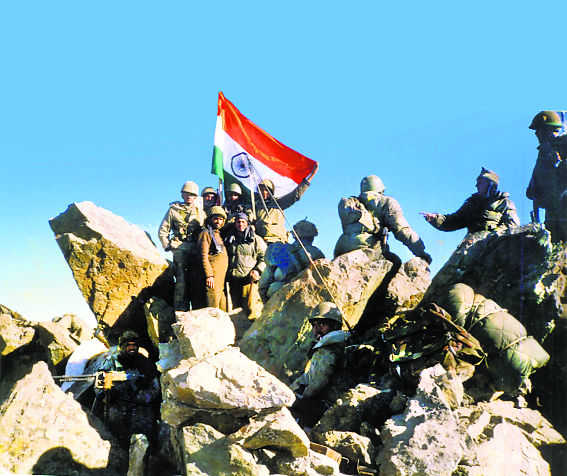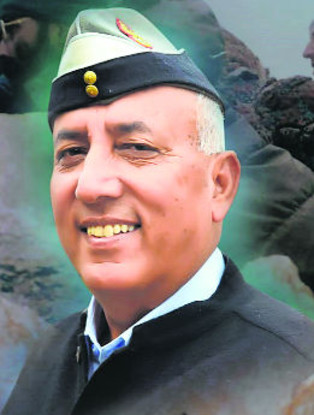
Brig Khushal Thakur (retd)
Ill-equipped and ill-informed, the country sent troops to fight Pakistani intruders in Dras sector. The victory came at a heavy cost, but paved the way for constant surveillance and technical improvement
Pratibha Chauhan in shimla
The capture of Tiger Hill during the Kargil aggression was termed as the “Mother of all battles” and it ultimately proved to be the turning point in the operation. The task was fearlessly executed by 18 Grenadiers, led by Col Khushal Thakur, and was honoured with 52 gallantry awards — the highest ever in a single military operation.
“The victory came at a very heavy cost — I lost 34 of my men in the capture of Tololing and Tiger Hill. So, it was a mixed feeling of joy and sorrow,” says Brig Thakur (then Colonel and since retired) as he prepares to travel to the very lofty heights where he and his men had waged a battle for almost 50 days. It was the summer of 1999 and the country is today celebrating the 20th anniversary of the Kargil operation.
India had been caught unawares, barely 300 to 400 m away from the well-fortified and equipped Pakistani troops perched at a dominating height. There came a stage when the bosses went to the extent of doubting the bravery of Brig Thakur and his men, who they felt were taking long to handle just a handful of militant intruders.
“On the one hand, there was pressure from the seniors and on the other hand, the morale of my troops was low because of heavy casualties. It was a very difficult and pressing period,” says Brig Thakur.
Had you realised then that the task of capturing Tololing Hill was not a mean one?
Though I was posted in the counter-insurgency grade in the Kashmir valley in Bandipora and Ganderwal area those days, I was on leave in Delhi. My second-in-command called me up on May 16, 1999, and told me that our unit, 18 Grenadiers, had been asked to move to Dras sector in view of intrusion by militants. They suspected infiltration by a few militants in the Dras, Kargil and Batalik sectors in February-March 1999. Being the closest, our unit was asked to move in. I thought it was not that tough a task and believed that coming from the thick of militancy in the Valley, my men would accomplish it easily.
When did you actually realise that the Army had failed to assess the gravity of the situation?
I was in Dras two days later and was told that there was heavy shelling and bombardment on the national highway connecting Srinara-Zojila-Kargil- Leh. Brig Surinder Singh briefed me that the Pakistan troops had the advantage of dominating heights and penetration was too close to the highway. I sought time for the acclimatisation of troops at the height of 15,000-16,000 feet and was given two days.
Having failed to assess the actual gravity of the situation, there was complete chaos and confusion. There was absence of detailed planning to the extent that we did not even have proper boots or equipment. I carried out the recce, planning and coordination and made Bimbat our administrative base. After two failed attempts and having lost Maj Rajesh Adhikari, who was martyred while capturing the third bunker, I decided to seek aerial support. It came, but the intruders shot down the helicopter, killing all four crew members. It was painful to be able to see the body of Maj Adhikari but being unable to retrieve it. Worse still, the casualties were mounting.
Havaldar Virender was hit by a sniper on the forehead while he was showing us the location of the intruders, who would hurl the choicest of abuses in chaste Punjabi on us. This shook our boys and I too was worried. We had no choice but to put up a brave front.
It was on a cloudy night at 8 pm on June 1 amid a drizzle that we embarked on the assault, only to realise that we had practically been pinned down. Lt Col R Vishwanathan and I were caught in heavy artillery and machine gun firing, such that we could not move an inch. Within no time, our radio operator Ram Kumar, who was behind me, and Subedar Randhir Singh, ahead of me, were killed. Soon I got news that Lt Col Vishwanathan had been injured. I ordered that he be pulled back, but, he had been seriously injured and we could not give him medical help. He breathed his last in my lap.
When did things turn in your favour?
It was with the arrival of logistics, including Bofors and 2 Rajputana Rifles. Bofors arrived around June 5 and we started bombarding the infiltrators. By June 12-13, we had captured Tololing. Our unit was then asked to capture Tiger Hill. We were better prepared for that with great help from 8 Sikh Regiment.
What thoughts came to your mind when you saw the tricolour aflutter at the Tiger and Tololing Hills?
Undoubtedly, it was a proud moment for all of us that we had accomplished the task assigned to us. It was, however, a mixed feeling of joy and sorrow as victory came at a very high cost. In all, I had lost 34 of my men, who were my family. Even today, the memory of Vishu (Lt Col Vishwanathan) breathing his last is so vivid that it makes me sad. I had decided to lead the assault in our third attempt to capture Tololing on the intervening night of June 1 and 2, and Lt Col Vishwanathan said: “Sir, how can I be far behind when you will be leading our men?” Despite telling him not to accompany me, he insisted and I lost him forever.
Do you ever feel things could have been handled differently?
If we had been given a little more time to prepare and had our logistics in place, so many casualties could have been prevented. Since the Pakistan army had already crossed the LoC and intruded almost 130 km into our territory, I feel there should not have been such a tearing hurry to launch the attack when we were not fully prepared.
But we all can think differently and wisely in hindsight. At that point, there was utter confusion as we thought it was an intrusion by some militants holed up in winter-vacated posts by our men. This was a routine phenomenon and both Indian and Pakistani forces would move down due to the harsh winters. It was only after feeling the heat of heavy fire of artillery, machine guns, automatic weapons and snipers that we sensed the enormity of the challenge. We had not come prepared accordingly.
Do you feel the Army has learnt its lessons?
There can be no denying that the inadequacy of surveillance and large gaps in defence had resulted in such heavy intrusion deep inside our territory. Having learnt our lessons, there now is constant surveillance and far more technically improved. The density of troops along the LoC has been enhanced tremendously and, most importantly, we are equipped with the latest equipment.
At the helm
Brig Khushal Thakur (retd) | Commanding Officer, 18 Grenadiers
Brig Thakur has participated in many operations and has a vast experience in the spectrum of conflict. It is under his leadership that 18 Grenadiers recaptured Tiger and Tololing during the Kargil War, evicting the well-entrenched enemy from the icy heights of the Dras region. He was honoured with Yudh Seva Medal. The valour of the unit made 18 Grenadiers the most decorated unit of the Kargil War. It was awarded one Param Vir Chakra, two Maha Vir Chakras and six Vir Chakras. The unit also got the Chief of Army Staff Citation and Theatre Honour.








